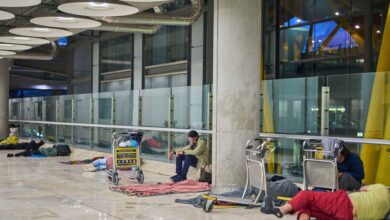UNICEF alarmed over incessant attacks devastating young lives — Global Issues

“I’m devastated by the ongoing attacks hitting heavily populated areas and killing and injuring many people, including children,” said Munir Mammadzade, UNICEF Representative to Ukraine, in a statement on Saturday.
In Poltava, a missile strike on a residential building reportedly injured three children, while at least four others were reportedly wounded in Kramatorsk, Sumy and Synelnykove in recent days.
The violence has left children not only with physical wounds but also deep psychological scars.
“These brutal attacks do not only cause physical and mental harm but strike at the holistic development of children,” Mr. Mammadzade stressed.
Schools damaged
The attacks are also taking a devastating toll on education.
In Odesa, two schools were reportedly damaged – one of which had received shatter-resistant film from UNICEF, preventing major interior damage. Two other schools in Nikopol and Zaporizhzhia also suffered damage.
UNICEF reiterated its call for the protection of children and the infrastructure they rely on such as schools, health facilities, social services and energy systems.
“Hitting heavily populated areas with explosive weapons must be avoided for the sake of every child, every civilian,” Mr. Mammadzade urged.
He also emphasised the need for a sustained peace, one in which children can recover from war, regain their education and rebuild their futures.
Health system under strain
The violence has exacerbated the already dire humanitarian situation, amid widespread destruction of homes, hospitals and other critical infrastructure.
Fighting has intensified along the Donetsk and Kharkiv frontlines, leading to mass displacement. In the first two weeks of January alone, over 1,600 people, including children, fled their homes, with mandatory evacuations ordered for families in high-risk areas, according to the Health Cluster.
Authorities reported the evacuation of 132 people, including 12 children, from Donetsk oblast on 11 January, while on 23 January, 267 children were evacuated from high-risk areas in Kharkiv oblast.
Responding to the situation, Health Cluster partners, in collaboration with local authorities, continue to deploy mobile medical teams to provide essential healthcare services and mental health and psychosocial support.
In January alone, teams delivered essential health services to 578 people in two designated transit centers in Kharkiv and Dnipro oblasts.
Led by UN World Health Organization (WHO), the Health Cluster coordinates the efforts of over 900 partners globally to address health needs in humanitarian emergencies, providing expertise, capacity-building and technical guidance to ensure effective and life-saving responses in crisis-affected regions.
https://static.globalissues.org/globalissues.png
2025-02-02 06:00:00




